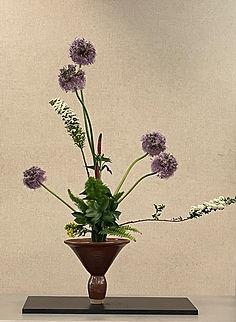
This is a focus on mindfulness through education in the Japanese art of flower arranging. It can reduce stress and provides a calm experience.

My Services.
-
Discover Ikenobo, the oldest and largest school of Ikebana, the Japanese art of floral design.
-
Beginner-friendly classes include a demonstration of several traditional styles, followed by the chance to create your own arrangement.
-
No experience needed—perfect for anyone curious about this unique and beautiful art form.
-
-
Details (in-person)
-
$50 instructor fee
-
Plus the cost of flower materials (varies depending on the style of arrangement, some basic materials are provided.)
-
Two hours class
-
Minimum class size is 4.
-
-
Details (virtual)
-
$30 instructor fee
-
Two hours class (varies by subject and participants)
-
Supporting Your Mental Health & Wellness
Ikenobo supports mental health and wellness by combining mindfulness, creativity, discipline, and connection to both nature and community. It is both an art form and a meditative practice that nurtures inner peace, resilience, and joy.
-
Mindfulness and Presence
-
The practice of Ikenobo requires focus, patience, and deliberate movement.
-
Arranging flowers encourages slowing down, being present, and observing details in nature.
-
This mindful engagement helps reduce stress and promotes relaxation.
-
-
Connection to Nature
-
Working with natural elements — flowers, branches, leaves, water — fosters a deep sense of harmony with the environment.
-
Contact with nature is proven to reduce anxiety and improve mood.
-
Seasonal awareness in Ikenobo cultivates gratitude and grounding in the present moment.
-
-
Creative Expression
-
Each arrangement is a unique reflection of balance, beauty, and the arranger’s inner state.
-
Creative outlets like Ikenobo help process emotions, stimulate the imagination, and provide a nonverbal form of self-expression.
-
-
Discipline and Growth
-
The centuries-old principles of Ikenobo — structure, form, and balance — provide a framework for continuous learning.
-
Practitioners experience personal growth, patience, and resilience as they refine their skills over time.
-
This sense of progress fosters confidence and self-efficacy.
-
-
Community and Shared Practice
-
Classes and study groups create connection, belonging, and cultural exchange.
-
Engaging in shared traditions strengthens social bonds, which are vital for emotional well-being.
-
-
Spiritual and Emotional Balance
-
Rooted in Buddhist philosophy, Ikenobo emphasizes harmony between people, nature, and the universe.
-
This spiritual dimension helps practitioners find balance, acceptance, and meaning beyond daily stresses.
-
My Story.
I am an Instructor of Ikenobo, First Grade (Junkako). I first studied in Japan while serving in the US Air Force, and I have been practicing the art for over 15 years. Now retired, I continue my studies and enjoy sharing this tradition by teaching classes.



.png)